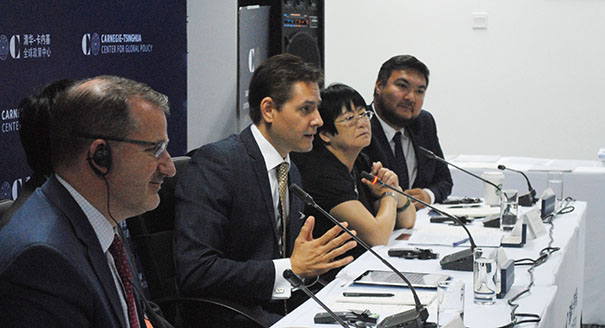The United Nations established September 21 as the International Day of Peace in 1981, with the aim of strengthening the ideals of peace among people and institutions around the world. Many decades earlier, Andrew Carnegie’s conviction that war could be eliminated by stronger international laws and organizations led him to establish the Carnegie Endowment for International Peace with a ten million dollar gift, and to charge its trustees to use the fund to “hasten the abolition of international war, the foulest blot upon our civilization.”
Over the last 100 years, the Carnegie Endowment has remained faithful to the mission of promoting peaceful engagement. In honor of Carnegie’s vision and on this year’s International Day of Peace, Carnegie-Tsinghua Center Director Paul Haenle moderated a discussion with Chinese and international experts on how the risks of conflict can be minimized in the Asia-Pacific, particularly as tensions continue to rise over North Korea’s development of nuclear weapons. Panelists examined solutions for reducing frictions in the U.S.-China relationship, achieving denuclearization on the Korean Peninsula, and maintaining stability between regional players.
This event was off the record and conducted in English with simultaneous translation.
Discussion Highlights
- Growing International Consensus: One discussant noted that China’s primary interest is ensuring peace and stability in the region. There was a consensus amongst the panelists that both China and the United States view a nuclear-armed North Korea as unacceptable and that the two countries stand firmly committed to pursuing North Korean denuclearization. As evidenced by the widespread consensus and speed with which UN Security Council Resolution 2375 passed, which imposed the most stringent set of sanctions yet, panelists argued that it is clear the international community condemns North Korea’s actions.
- Sanctions Alone Aren’t Enough: Although China has agreed to the most recent and strictest sanctions package, one discussant said it is still unclear whether sanctions alone will have any effect on Kim Jong Un’s decisionmaking calculus. Many of the panelists expressed skepticism about the utility of the economic measures. One panelist noted that sanctions should not just be considered a punishment mechanism, but should also be understood as an important way of signaling the international community’s unified will and disapprobation. All of the panelists agreed that other options need to be considered.
- Exploring Other Options: Panelists argued that both deterrence and diplomacy should be pursued to achieve denuclearization on the peninsula. One discussant critiqued political leaders’ bellicose rhetoric, saying both the United States and China could deescalate the conflict by making concessions. Another panelist discussed the role of diplomacy and the need for short- and long-term goals. For example, the discussant said that deliberating on what a peaceful Korean peninsula could look like in ten years may be helpful in bringing the parties back to the negotiating table. One panelist disagreed, arguing instead that the United States needs to establish more leverage to bring North Korea back to the table. A separate panelist expressed their skepticism that Kim Jong Un would be willing to halt his pursuit of nuclear weapons.
Zhou Qi
Zhou Qi is the executive director of the National Strategy Institute at Tsinghua University.
Jomart Ormonbekov
Jomart Ormonbekov is a political liaison officer at the United Nations Department of Political Affairs in Beijing.
Li Bin
Li Bin is a senior fellow working jointly in the Nuclear Policy Program and Asia Program at Carnegie–Tsinghua Center for Global Policy and a professor of Tsinghua University.
Michael Kovrig
Michael Kovrig is a senior advisor for North East Asia at the International Crisis Group.
Paul Haenle
Paul Haenle is the director of the Carnegie–Tsinghua Center for Global Policy based at Tsinghua University in Beijing.
